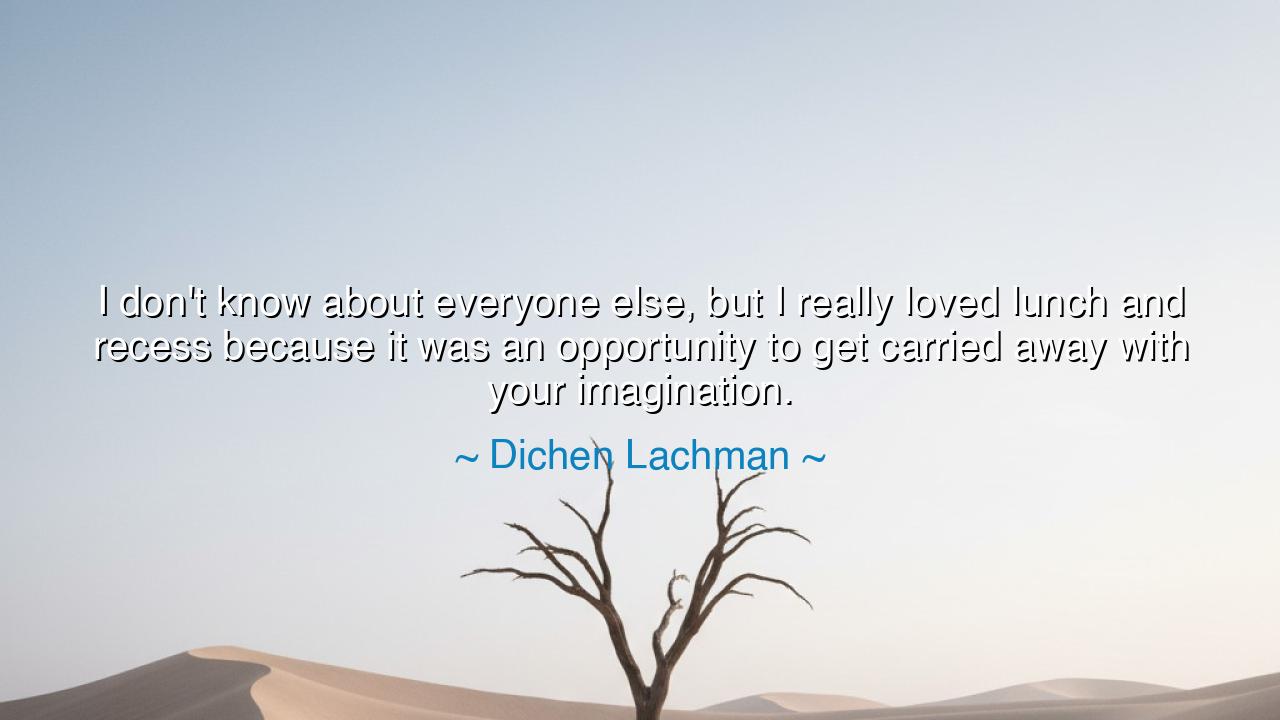
I don't know about everyone else, but I really loved lunch and
I don't know about everyone else, but I really loved lunch and recess because it was an opportunity to get carried away with your imagination.






“I don’t know about everyone else, but I really loved lunch and recess because it was an opportunity to get carried away with your imagination.” Thus spoke Dichen Lachman, an actress and storyteller whose life has traversed many cultures and worlds. Her words, gentle yet profound, recall the sacred innocence of childhood — that time before the weight of reason silenced the song of wonder. In them lies not nostalgia alone, but a timeless truth: that the imagination is the purest form of freedom, and that in moments of play, the soul remembers what it truly is — unbounded, joyful, and alive.
Lachman’s reflection arises from the memory of the schoolyard — that humble stage upon which countless worlds were built from dust and daydreams. To the child, recess and lunch were not simply hours of rest from study, but portals into infinity. A stick became a sword, a friend became a dragon, and the mind, released from duty, soared. In that brief space of time, the heart ruled, and imagination wrote its own laws. It is there, she reminds us, that the spirit of creativity is born — not in the quiet of the classroom, but in the wildness of play.
There is wisdom in her remembrance. For as we grow older, society teaches us to confine our thoughts, to measure our worth by logic and productivity. Yet the child’s imagination, that once boundless sea, becomes a narrow stream — controlled, directed, and soon forgotten. Lachman’s words are a plea, softly spoken, for us to return to that ancient freedom, to allow ourselves once more to “get carried away.” For to be carried away by imagination is not to lose control, but to rediscover creation. Every artist, inventor, and dreamer has lived in that same spirit of recess — where rules are suspended and the impossible becomes play.
History bears witness to this truth. Consider the young Albert Einstein, who, as a child, was often lost in thought, imagining himself riding upon a beam of light. Teachers called him slow, inattentive, and distracted. Yet it was in those very wanderings of imagination that the theory of relativity was born. His mind played where others only studied. In his heart, as in the playground of Lachman’s memory, the laws of the universe were first discovered not through discipline, but through wonder. Thus, even the greatest minds are children who never stopped playing.
In the ancients’ time, play was seen not as folly, but as divine. The Greeks spoke of paidia — the sacred play that mirrored the joy of the gods. Creation itself, they said, was born from the laughter of the divine, from the imagination of that which dared to dream itself into being. So when Lachman recalls her joy in those moments of freedom, she speaks with the wisdom of ages — that joy and creativity are not luxuries, but the essence of life. To create is to play with the universe, to let the heart and mind dance in harmony once more.
Yet, how few of us allow ourselves to play as adults! We confine our imagination to screens, our wonder to distractions, and our creativity to narrow definitions of usefulness. The recess of the spirit has been replaced by endless labor. But the soul, like the child, cannot thrive without freedom. Lachman’s remembrance invites us to reclaim this sacred time — to step away, to dream without purpose, to be carried away once more by the beauty of what could be. For it is in such moments that new ideas are born, and the weary heart finds renewal.
So let this be the lesson, O listener: never outgrow your imagination. Take time, each day, for your own recess — moments where you set aside duty and surrender to wonder. Paint, walk, sing, daydream — not for achievement, but for joy. Allow yourself to get carried away, as the child once did, for in those moments you will glimpse again the divine spark that moves all creation. The mind that plays is the mind that creates; the heart that dreams is the heart that heals.
Thus, Dichen Lachman’s gentle memory becomes a teaching for all ages: imagination is not a relic of youth, but the eternal companion of the spirit. Guard it, nurture it, and give it freedom. For when you let your thoughts play again — in laughter, in curiosity, in courage — you return to your truest self. And in that sacred return, you will find that life itself, at its deepest core, has always been one long, wondrous recess.






AAdministratorAdministrator
Welcome, honored guests. Please leave a comment, we will respond soon